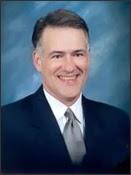
Tony Farese
How many ways can a criminal-defense lawyer cheat his own client? The prosecution of Mississippi insurance broker Ken Nowlin presents a classic case study on that disturbing question.The Bush Justice Department indicted Nowlin, alleging he and former Lafayette County Supervisor Gary Massey had engaged in a kickback scheme involving an employee health-care contract. The case never went to trial because both men pleaded guilty, but a growing body of evidence suggests they were unlawfully pressured to plead guilty to crimes they did not commit.
How could this happen in a democracy where counsel supposedly has a sacred duty to represent the best interests of his client? The answer seems to be this: Quite a few attorneys do not take their sacred duties seriously--and that especially seems to apply at the Ashland, Mississippi, firm of Farese Farese & Farese.
We've already shown that one member of that august firm, Steve Farese Sr., was so busy sexually harassing client Penni Tingle that she wound up entering a guilty plea that she now seeks to have overturned. Anthony L. "Tony" Farese was slightly more subtle with his client, Ken Nowlin. But the end result was the same--a government target wound up pleading guilty to a "crime" we now know he almost certainly did not commit.
Our research indicates members of the Farese firm are more interested in gaining favor with government prosecutors than in representing the best interests of their clients. We also see signs that the Farese lawyers are not alone; Birmingham lawyer G. Douglas Jones, who once served as defense counsel for former Alabama Governor Don Siegelman, seems to have a similar habit. In fact, Jones testified before Congress in 2007 about his undying respect for Bill Pryor, the former Alabama attorney general and current federal judge who is responsible for launching the Siegelman investigation.
How did Tony Farese coax a bogus guilty plea out of Ken Nowlin? For one thing, it's important to understand that federal statutes tend to be written in such murky language that most citizens have no idea what they say. God only knows how many Americans have pleaded guilty to violating statutes that they could not begin to understand--and in some cases, we are talking about defendants who are well educated.
Public documents show that Farese used a sort of "yin and yang" game with Nowlin--failing to dig for information that might have proven his client's innocence, while applying extraordinary pressure about the dangers of going to trial. (See document at the end of this post.) Let's take a closer look at how these two con games worked:
* Evidence, what evidence? Court documents show that Nowlin informed Farese repeatedly that Massey had a letter from Lafayette County Scot Spragins, saying that the payment arrangement Nowlin and Massey planned to implement was lawful. In fact, Nowlin told Farese and assistant U.S. attorneys Tom Dawson and David Sanders about the letter during a meeting on March 19, 2007. From the court file, where Nowlin is referred to as "petitioner":
During this meeting, Petitioner explained how and why he paid Massey the way he did. He also told them about the letter Mr. Massey said he had that allowed Petitioner to pay Mr. Massey the way he did. When Mr. Dawson asked Petitioner for a copy of the letter, Petitioner told him that he did not have one but they could get a copy of the letter from Mr. Massey. He explained that he and Mr. Massey did not conspire to hide anything and that there was no kickback or bribe involved in the way he paid Mr. Massey. Petitioner told them that Mr. Massey did not even know how he was paying him.
Did Farese make any effort to obtain a copy of this letter, which likely would have proven his client's innocence? It doesn't look like it. Nowlin wound up pleading guilty, and five days later, a Mississippi newspaper published an article about the Spragins letter to Massey.
* The prospect of a 75-year sentence--Nowlin began frantically calling Farese's office, to get a meeting about withdrawing the guilty plea. They could not meet with Farese until almost two months later. Larry Nowlin attended that meeting with his brother and provides this account in an affidavit:
Partly on my advice, Ken pled guilty on July 27, 2007. On September 28, 2007, I drove Ken to Ashland to see Farese. During this meeting, Ken told Farese that he wanted to withdraw his guilty pleea and tried to explain to Farese that he would have earned his four percent override on the Lafayette County insurance account no matter who had the insurance with the county. Farese became very angry and told Ken that he could not understand how he had ever made what he had made of himself as dumb as he was. Farese told us that we were not going to embarrass him and started dictating a letter saying that he was getting out of the case and told us to get out of his office.
Farese called me later that day and told me that if Ken was allowed to withdraw his guilty plea, he could be going to prison for 75 years. Farese also told me that if Ken insisted in going to trial, it would cost Ken more than $200,000. On my advice, Ken wrote Farese and told him that he did not want to withdraw his guilty plea . . .
Ken Nowlin wound up being sentenced to 30 months in federal prison. But we can all be thankful that Tony Farese was not embarrassed before his prosecutorial buddies.
(To be continued)
